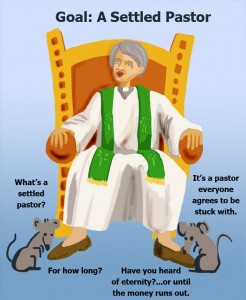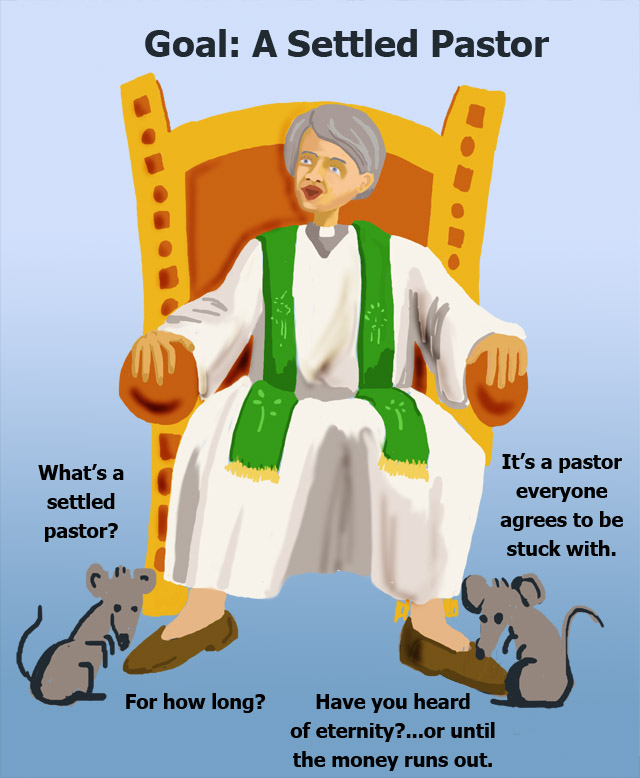God’s Call vs A Congregational Call
The call process in the Lutheran Church is a bit of a mystery. It operates on two levels.
There is the call to vocation, which comes from God. Preachers love to tell the story of how they thought their lives were headed in one direction and suddenly God grabbed them by the elbow and pointed them toward the Church. This type of call is documented in the Bible—Noah, Moses, Saul, David, Jonah, Job, Mary and all those disciples and the succession of apostles.
Then there is the congregational call. This call is issued by congregations or perhaps extensions of the Church (hierarchy, seminaries, camps and social service agencies).
Sometimes we get the two confused. The process makes it seem like every congregational call is akin to a biblical call, with God pulling the strings.
The ELCA call process is often more convoluted—and weighted toward the interests of clergy and synods.
Biblical calls were usually undesirable, risky, downright dangerous. Today’s congregational calls come with mandated salaries, benefits and perks.
There are two types of constitutional calls.
Term calls end when the designated time is up. (Bishops have term calls.)
Regularized calls, now being called “settled” calls, have no time limitation. The pastor can leave with 30 days notice or the congregation can rally a two-thirds vote to make a change. If things go well, no problem. If things are not going well, conflict is likely to result.
Redeemer’s Experience with the Call Process
At Redeemer we had some interesting and sometimes dramatic experiences with the call process. We went along with it for years. There came a point when we realized that our partner in the call process — the synod — was less than forthright. The candidates being presented to us were needy. They were being sent in our direction to satisfy their problems not to serve. They needed the income. Their roster credentials were expiring. They had serious problems in previous churches. They wanted their families to be disrupted as little as possible. They were seeking a secure and comfortable life.
We had yet to read the published theories about “caretaker ministries.” Caretaker ministries are ministries of intentional neglect. Pastors are expected to do nothing but keep people happy while the congregation dies. Ten years of neglect is expected to result in a successful caretaker ministry and closed church. (Why aren’t ELCA congregations outraged by this?)
Lay leaders aren’t let in on this secret. Lay leaders think they have called a pastor who will make a difference. They keep trying, spending resources on the required pastor, but doing the work alone.
Of course, the result is strife. Guess who is to blame!
In 1997, Redeemer issued an 18-month term call to a synod staff member. Bishop Almquist pulled the pastor out after three months. He needed his service in the suburbs. No other solution to filling the pulpit was offered for the following year. Was this an escalation of the intentional neglect of a caretaker minister? (A year later Bishop Almquist seized a big chunk of our endowment money. He sent that pastor to our bank!)
Within three years we went from the same Bishop pulling a “called” pastor out to attempting to force an “uncalled pastor” in.
In 2000, we were asked to regularize the call of a pastor who had been serving a one-year term. The congregation council did not recommend renewing the call under the conditions the synod presented — which reduced service from 12 hours a week to 10 hours a week. Congregational leaders felt responsible for more ministry—not less. We were willing to renew the term call, while we sought a better solution. (This was before the interim concept had taken hold.) The reduction was the pastor’s idea — not ours. (Ten hours a week happens to be the minimum required to maintain a pastor’s roster status. Rostered status maintains things like pensions and credentials.)
The goal of synod leadership was to make this weak relationship permanent—even though there is no constitutional requirement to do so. The interests of the synod and the pastor trumped the interests of the congregation.
Bishop Almquist asked Redeemer’s council to vote again. The second vote failed, too. Bishop Almquist insisted that the call question be presented to the congregation. He was hoping that the congregation would vote against their leadership. Yep, he was orchestrating dividing the congregation! The congregational vote—the third vote on this call—failed, too.
Bishop Almquist refused to work with Redeemer in presenting any other candidates.
The mysterious call process shrouds a basic fact.
Synods exist in large part to keep pastors employed. Since clergy talk with each other more than with congregations, congregations are always at a disadvantage.
Once those settled calls are finalized, change is almost impossible without conflict. That’s OK. It creates a job market for interim pastors—one of the few areas of ministry that seems to be growing. All the perks of rostered clergy with minimal commitment.
The Call Process in Action
Recently, we encountered the call process again. Our Ambassadors attended a service that featured a trial sermon followed by a congregational vote on a candidate’s call.
A congregation’s future was resting on what would take place during this hour. Congregational representatives had already spent some time with the candidate. There had been a congregational “meet and greet.”
The trial sermon should be a critical part of a job interview — an opportunity to display leadership and vision.
The service began with the pastoral candidate apologizing for being late. Logistics. The apology continued. There had been no time to study the order for worship. Please bear with the circumstances.
In the secular world, this might be considered getting off on the wrong foot.
The congregation graciously gave the candidate the necessary direction. On with the liturgy.
Things went fairly well.
Time for the sermon—the all important trial sermon. Surely, the candidate had slaved in preparation. The candidate would want to demonstrate a grasp of theology and how it might influence leadership and the direction of the congregation. The candidate would want to build on conversations with church leaders and inspire the congregation who would be voting in just minutes.
The candidate began the sermon by asking the congregation to identify the liturgical color for Pentecost. The congregation called out correctly, ”Red!” No, the candidate said, pointing to the paraments. It is green to symbolize growth.
Green is the color for the Sundays AFTER Pentecost—Ordinary Time. Incomplete information was preached.
The lesson for the day was the gospel story of the widow of Nain at the funeral of her only son. The candidate addressed the Gospel story briefly, mentioning how “neat” it was that Jesus only touched the funeral bier to bring the young man back to life. The candidate defined bier for those of us with limited vocabulary.
The candidate rambled from that point on, talking about personal struggles. Jesus had lifted the candidate from a troubled past, just as he raised the widow’s son. The rest of the sermon was all about her life.
The candidate’s family was introduced. A recently deceased family member who had been prominent in the church was mentioned. His presence was felt.
Things had better go well!
The vote seemed to be a formality. It would be cruel to parade the children before the congregation if there were any chance a vote might not succeed.
Asking a congregation to vote on such a flimsy foundation would be considered preposterous in any other organizational venue. But not in the Church. In the Church it is par for the course to limit information given to congregations. Bishop Almquist had even refused to provide a candidate’s name prior to meeting the congregation. The less the congregation knows the better.
Likability seems to be the major credential in creating “settled” pastorates—not theology, not preaching, not leadership skills or a successful mission record.
We left at the end of worship. We don’t know what questions were raised in the voting process.
According to the congregation’s website. the congregation voted to approve this “settled” call.
The congregation voted for a candidate who arrived late and unprepared, who displayed minimal theological insight, who talked down to the congregation, presented misleading information, spoke in great detail of a deeply troubled past, showed no grasp of the congregation’s immediate challenges and shared no vision for their future together.
They have their settled pastor.
Under the same circumstances, a secular organization would keep looking.
There is a reason congregations accept candidates with ease. There is the tendancy to want to be friendly—and if a congregation does not cooperate, the congregation is labeled as troubled and the pool of candidates dries up. In other words, we have little choice.
If status quo is maintained for the next few years, the call will be celebrated as successful.
If the congregation declines, the quality of professional leadership will not be cited.
The call process in the ELCA needs a serious overhaul. The interests of the congregation need to come first—way before the comfort and convenience of candidates. This does not require a constitutional change. Rather, it requires a change in attitude among professional leaders.
There needs to be professional accountability. There needs to be a service mindset—not an entitlement mindset.
It should start with a more realistic call process.
Read Undercover Bishop—a parable written from our Ambassadors’ experience visiting 65 churches in two years.
One More Example of the Redeemer Call Process
Redeemer went for years without a called pastor. Bishop Almquist did not work with our congregation at all for most of his second term. During this time Redeemer formed strong relationships with many pastors.
We worked with two qualified Lutheran pastors who were both well liked and were demonstrating their ability to work with the current church members and to grow the congregation. Fifty-one members joined while we worked with both pastors. We wanted to call one and struggled to determine which to call. At last one became unavailable which made our decision for us. We thought that a new bishop might not have the prejudices of the previous bishop. A fresh start! We brought a resolution to Bishop Burkat requesting a call. All the details of the call had been worked out and agreed upon and the pastor was willing to commit five years. All we needed to move Redeemer forward in a strong way was Bishop Burkat’s approval of the call.
The bishop’s office met privately with the candidate and we never saw him again. A few weeks later, there having been no conversation with our congregation, we received the letter that we were closed. Two months after that we received the letter revealing that SEPA Synod, even at that time, was already trying to sell our property—property that did not belong to them and which the Synod’s Articles of Incorporation expressly forbid them from conveying without the consent of the congregation.


